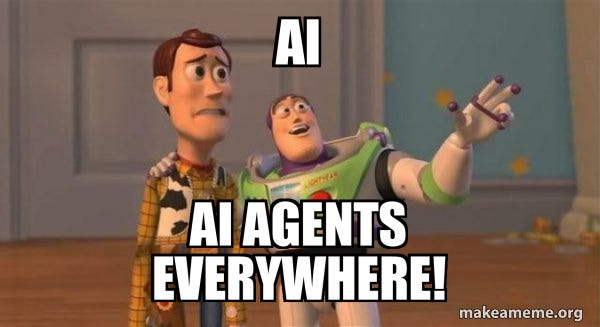Agentic vibe marketing is already here
One smart marketer + AI iAgents s the new 5 person growth team
I watched a solo marketer ship more in one month than most five person teams ship all year. One person. Zero standups about blockers.
The Ringelmann Effect proved this a century ago. As group size increases, individual productivity drops. Add Brooks’s Law and you get the real problem. Adding people to a late project makes it later. Headcount creates drag.
With the right tools, one clued-in marketing operator can do what used to take a mini army. You don’t need a full-stack growth team, but you do need few AI agents who never sleep.
One smart marketer + AI agents = the new five-person growth team.
A few years ago "solo developer" went from a meme to a movement. Now it’s happening to marketing.
Remember the old way?
Marketing team:
A copywriter for landing pages
A designer to prettify things
A media buyer to run experiments
A data analyst to explain why nothing’s working
A bunch of standups to discuss blockers that shouldn’t exist
That was the playbook. Expensive, slow, and oddly fragile. A single campaign could take a month to launch and that was considered "lean."
Now?
You can replace most of that team with workflows.
One marketer with the right tech stack can:
Build and launch a microsite with custom content for 5 ICPs
Auto-generate cold emails based on scraped content, tone-matched to each lead
Capture competitor ad copy and test 100 better versions in minutes
Launch a campaign across email, social, and landing pages by tomorrow
Map conversion data across user segments without bothering your data team
What’s wild is that this is already happening.
This might be the org chart of the future. Everyone below "User" will be an AI agent.
What changed?
Three things clicked into place:
AI tools got usable – not just for writing, but for workflows, micro saas, visuals, audience research.
Automation isn’t just for engineers anymore – with tools like n8n and Make, anyone can build logic-based flows.
Custom tools are fast and cheap to create – think weekend MVPs, not month-long sprints.
A recent McKinsey report estimates that generative AI could contribute up to $4.4 trillion in annual global productivity, with marketing and sales functions poised to capture a significant portion of this value.
Execution speed isn’t gated by headcount anymore.
The arbitrage moment most founders are missing
Right now, most startups are still hiring for the old marketing org chart a strategy that often leads to disappointing outcomes.
I covered this exact mistake in Why This $150K Startup Marketing Hire Failed, where founders bet on headcount instead of systems. They’re piecing together junior generalists and hoping for magic.
Meanwhile, skilled solo marketers are quietly building stacks that:
Test faster
Learn faster
Scale faster
This is the actual arbitrage:
Being 10x more efficient at getting attention, generating leads, and learning what works before your competitors even finish briefing their design team.
The cost of failure is near zero. That means the cost of hesitation is massive.
So how do you play this?
This doesn’t mean you fire everyone tomorrow. It means you rethink what execution looks like.
The smartest operators I’m seeing aren’t thinking in tools. They’re thinking in systems. Workflows that create momentum without manual work every time. Self-improving marketing loops that test, adapt, and scale without waiting for approvals.
They’re building owned distribution channels instead of renting all their growth from platforms they can’t control. Email lists. SEO visibility. Even LinkedIn presence, as painful as that sounds.
AI tools that power vibe marketing in 2025
Marketing MVP/web app builders:
Lovable, Bolt, Replit, Curosr
Marketing video editors:
Marketing creative tools:
Marketing automations:
Try one. Automate a thing you hate doing. That’s how you start.
For example I’ve helped automated my marketing teams internal briefing and approval process with Make, Trello and Slack. Right now I’m experimenting more with n8n and it looks really promising.
Small teams now have creative superpowers that Fortune 500 marketing departments couldn't touch five years ago.
Here is an example Pika in action.
This is what an AI agent marketing workflow looks like in n8n
Startups used to pick between two tradeoffs:
Move fast with a small team and sacrifice quality
Hire a big team and slow everything down
Not anymore.
The smartest marketers and founders are now asking:
“What could we do if one person could execute like an entire team?”
A lot more than you think.
Imagine giving marketers 100 agentic hands and letting them work on what actually matters.
North star for agentic vibe marketing
Agentic Vibe Marketing = Vibe Coding + AI Agents + Taste.
The next breakout startups will be the ones with the leanest, most agent-augmented growth systems. Set up by operators who know how to blend creativity, systems thinking, code, and AI into one repeatable flywheel.
But they’ll also need marketing leaders who can survive startup chaos and think like operators. I’ve written about that in How to Succeed as a Startup CMO (Without Burning Out in 6 Months), which covers the mindset shifts required to survive.
The question isn’t whether AI can do marketing.
It’s how long before your competitors figure out that one person can outwork your entire team.
Martin
P.S. If you’re building agent-powered marketing systems and want to compare notes, reply to this email. I’m curious what’s actually working.








100% agree with everything here. Though that much needed shift in mindset is not yet implemented, even in the most innovative tech companies out-there. As mentioned in this stack, it will take marketing leaders to be great operators as well.
This is the future of marketing ... Speaking of the team, I'm already asking myself whether I should hire a new resource or whether I can use AI to enable my team to double its output